Analysis of Employee Resistance in Management of Change Strategies
VerifiedAdded on 2020/05/16
|12
|2582
|140
Essay
AI Summary
This essay delves into the critical aspects of change management within organizations, focusing on the pervasive issue of employee resistance. It begins by defining organizational change and highlighting its significance in adapting to market dynamics and enhancing productivity. The essay then explores the reasons behind employee resistance, including factors such as fear of job loss, lack of communication, and inadequate training. It examines the behavioral impacts of this resistance, including emotional and attitudinal shifts. Furthermore, the essay analyzes the ethical implications of resistance, particularly the interplay between power and resistance, and discusses how ethical considerations should guide change management practices. It emphasizes the importance of transparency, employee involvement, and creating a positive organizational culture to mitigate resistance and foster successful change management programs. The essay concludes by underscoring the need for managers to understand the dynamics of resistance and power to implement change ethically and effectively. This assignment is published on Desklib, a platform providing AI-based study tools for students.
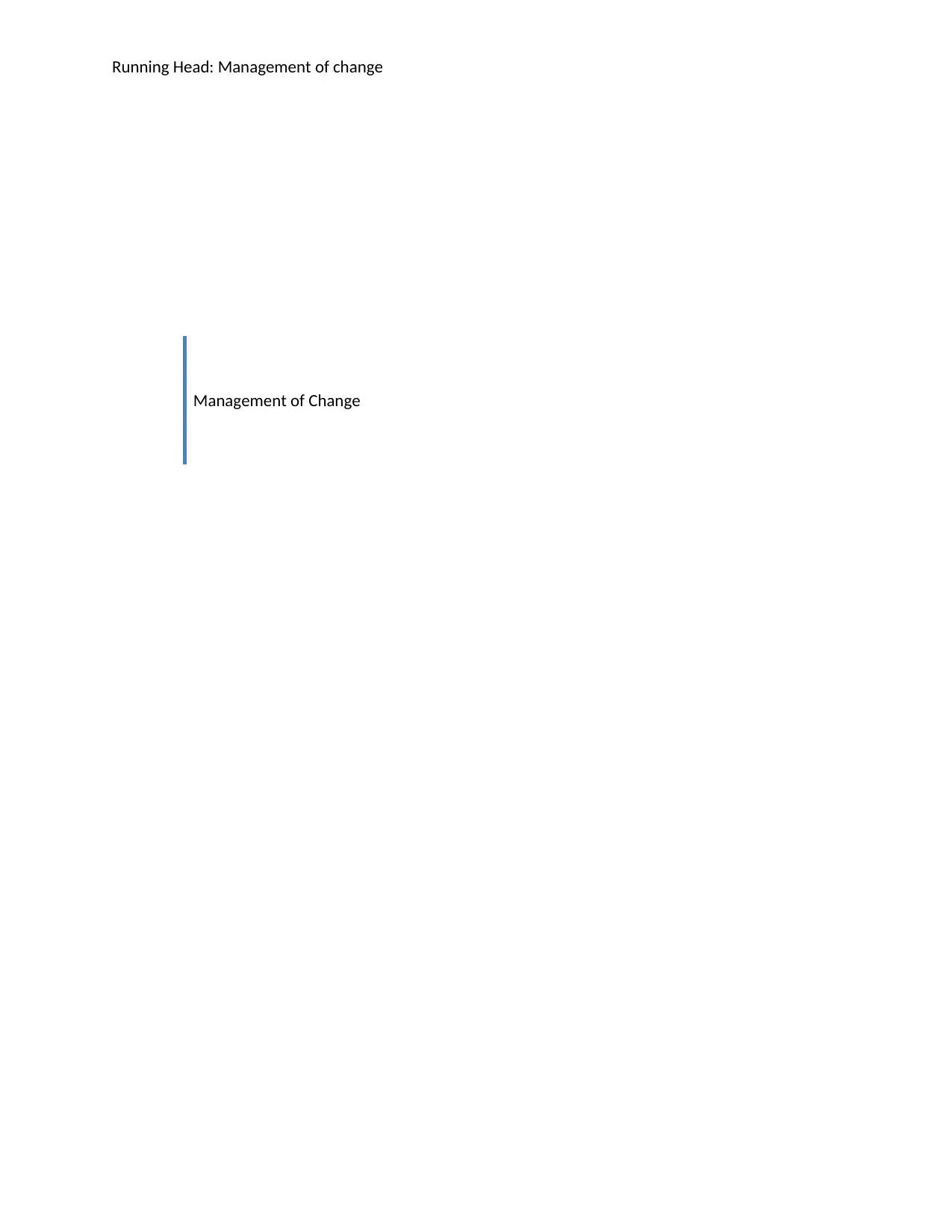
Running Head: Management of change
Management of Change
Management of Change
Paraphrase This Document
Need a fresh take? Get an instant paraphrase of this document with our AI Paraphraser
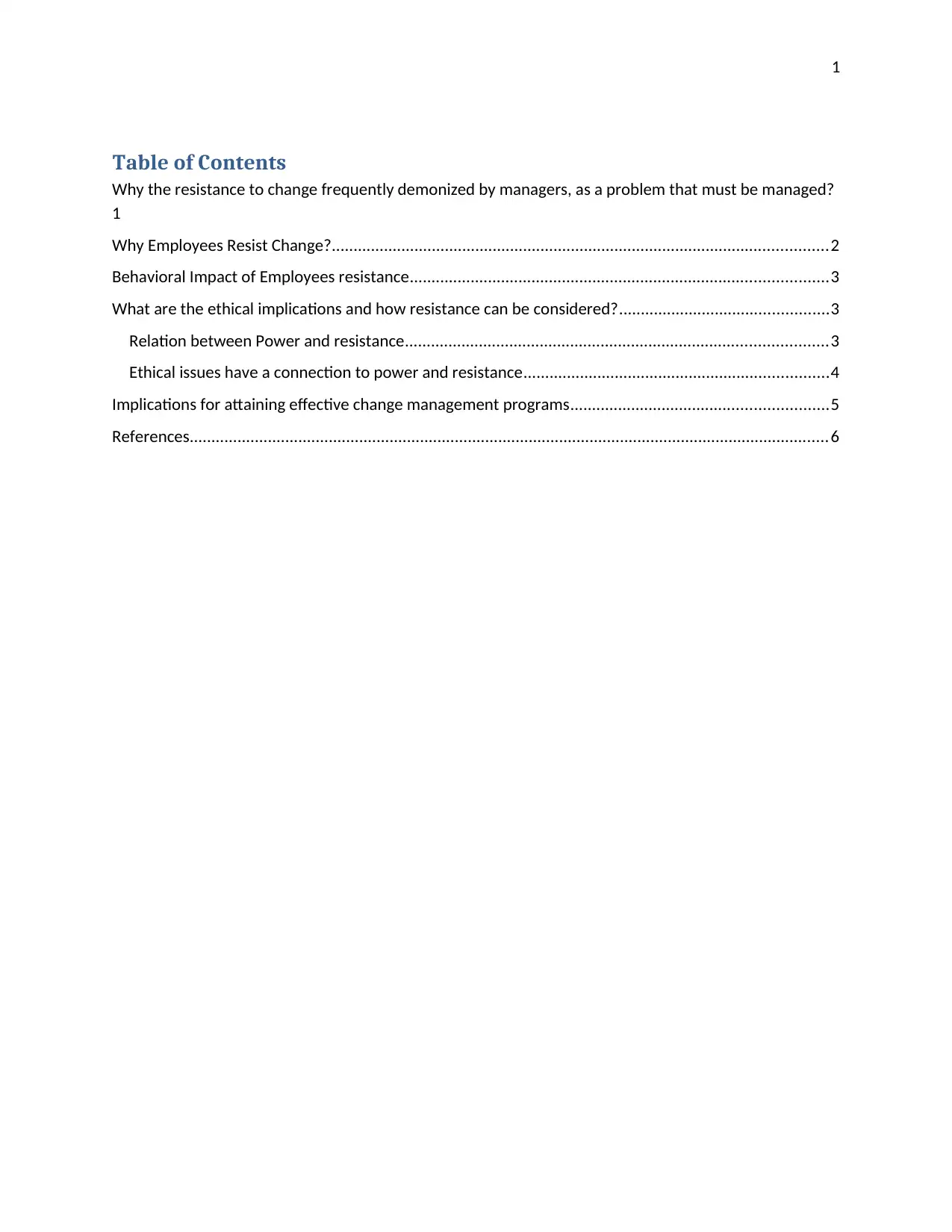
1
Table of Contents
Why the resistance to change frequently demonized by managers, as a problem that must be managed?
1
Why Employees Resist Change?..................................................................................................................2
Behavioral Impact of Employees resistance................................................................................................3
What are the ethical implications and how resistance can be considered?................................................3
Relation between Power and resistance.................................................................................................3
Ethical issues have a connection to power and resistance......................................................................4
Implications for attaining effective change management programs...........................................................5
References...................................................................................................................................................6
Table of Contents
Why the resistance to change frequently demonized by managers, as a problem that must be managed?
1
Why Employees Resist Change?..................................................................................................................2
Behavioral Impact of Employees resistance................................................................................................3
What are the ethical implications and how resistance can be considered?................................................3
Relation between Power and resistance.................................................................................................3
Ethical issues have a connection to power and resistance......................................................................4
Implications for attaining effective change management programs...........................................................5
References...................................................................................................................................................6
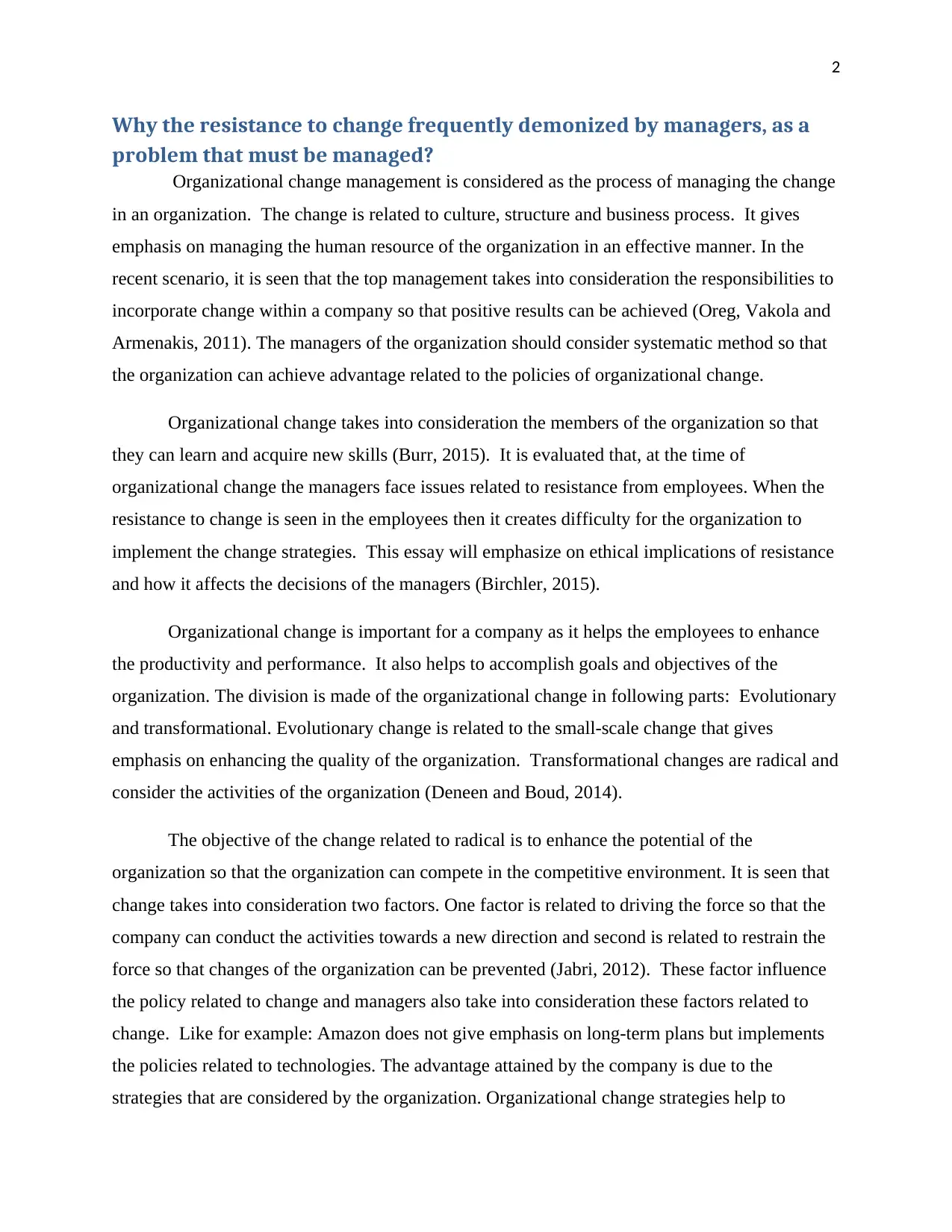
2
Why the resistance to change frequently demonized by managers, as a
problem that must be managed?
Organizational change management is considered as the process of managing the change
in an organization. The change is related to culture, structure and business process. It gives
emphasis on managing the human resource of the organization in an effective manner. In the
recent scenario, it is seen that the top management takes into consideration the responsibilities to
incorporate change within a company so that positive results can be achieved (Oreg, Vakola and
Armenakis, 2011). The managers of the organization should consider systematic method so that
the organization can achieve advantage related to the policies of organizational change.
Organizational change takes into consideration the members of the organization so that
they can learn and acquire new skills (Burr, 2015). It is evaluated that, at the time of
organizational change the managers face issues related to resistance from employees. When the
resistance to change is seen in the employees then it creates difficulty for the organization to
implement the change strategies. This essay will emphasize on ethical implications of resistance
and how it affects the decisions of the managers (Birchler, 2015).
Organizational change is important for a company as it helps the employees to enhance
the productivity and performance. It also helps to accomplish goals and objectives of the
organization. The division is made of the organizational change in following parts: Evolutionary
and transformational. Evolutionary change is related to the small-scale change that gives
emphasis on enhancing the quality of the organization. Transformational changes are radical and
consider the activities of the organization (Deneen and Boud, 2014).
The objective of the change related to radical is to enhance the potential of the
organization so that the organization can compete in the competitive environment. It is seen that
change takes into consideration two factors. One factor is related to driving the force so that the
company can conduct the activities towards a new direction and second is related to restrain the
force so that changes of the organization can be prevented (Jabri, 2012). These factor influence
the policy related to change and managers also take into consideration these factors related to
change. Like for example: Amazon does not give emphasis on long-term plans but implements
the policies related to technologies. The advantage attained by the company is due to the
strategies that are considered by the organization. Organizational change strategies help to
Why the resistance to change frequently demonized by managers, as a
problem that must be managed?
Organizational change management is considered as the process of managing the change
in an organization. The change is related to culture, structure and business process. It gives
emphasis on managing the human resource of the organization in an effective manner. In the
recent scenario, it is seen that the top management takes into consideration the responsibilities to
incorporate change within a company so that positive results can be achieved (Oreg, Vakola and
Armenakis, 2011). The managers of the organization should consider systematic method so that
the organization can achieve advantage related to the policies of organizational change.
Organizational change takes into consideration the members of the organization so that
they can learn and acquire new skills (Burr, 2015). It is evaluated that, at the time of
organizational change the managers face issues related to resistance from employees. When the
resistance to change is seen in the employees then it creates difficulty for the organization to
implement the change strategies. This essay will emphasize on ethical implications of resistance
and how it affects the decisions of the managers (Birchler, 2015).
Organizational change is important for a company as it helps the employees to enhance
the productivity and performance. It also helps to accomplish goals and objectives of the
organization. The division is made of the organizational change in following parts: Evolutionary
and transformational. Evolutionary change is related to the small-scale change that gives
emphasis on enhancing the quality of the organization. Transformational changes are radical and
consider the activities of the organization (Deneen and Boud, 2014).
The objective of the change related to radical is to enhance the potential of the
organization so that the organization can compete in the competitive environment. It is seen that
change takes into consideration two factors. One factor is related to driving the force so that the
company can conduct the activities towards a new direction and second is related to restrain the
force so that changes of the organization can be prevented (Jabri, 2012). These factor influence
the policy related to change and managers also take into consideration these factors related to
change. Like for example: Amazon does not give emphasis on long-term plans but implements
the policies related to technologies. The advantage attained by the company is due to the
strategies that are considered by the organization. Organizational change strategies help to
⊘ This is a preview!⊘
Do you want full access?
Subscribe today to unlock all pages.

Trusted by 1+ million students worldwide
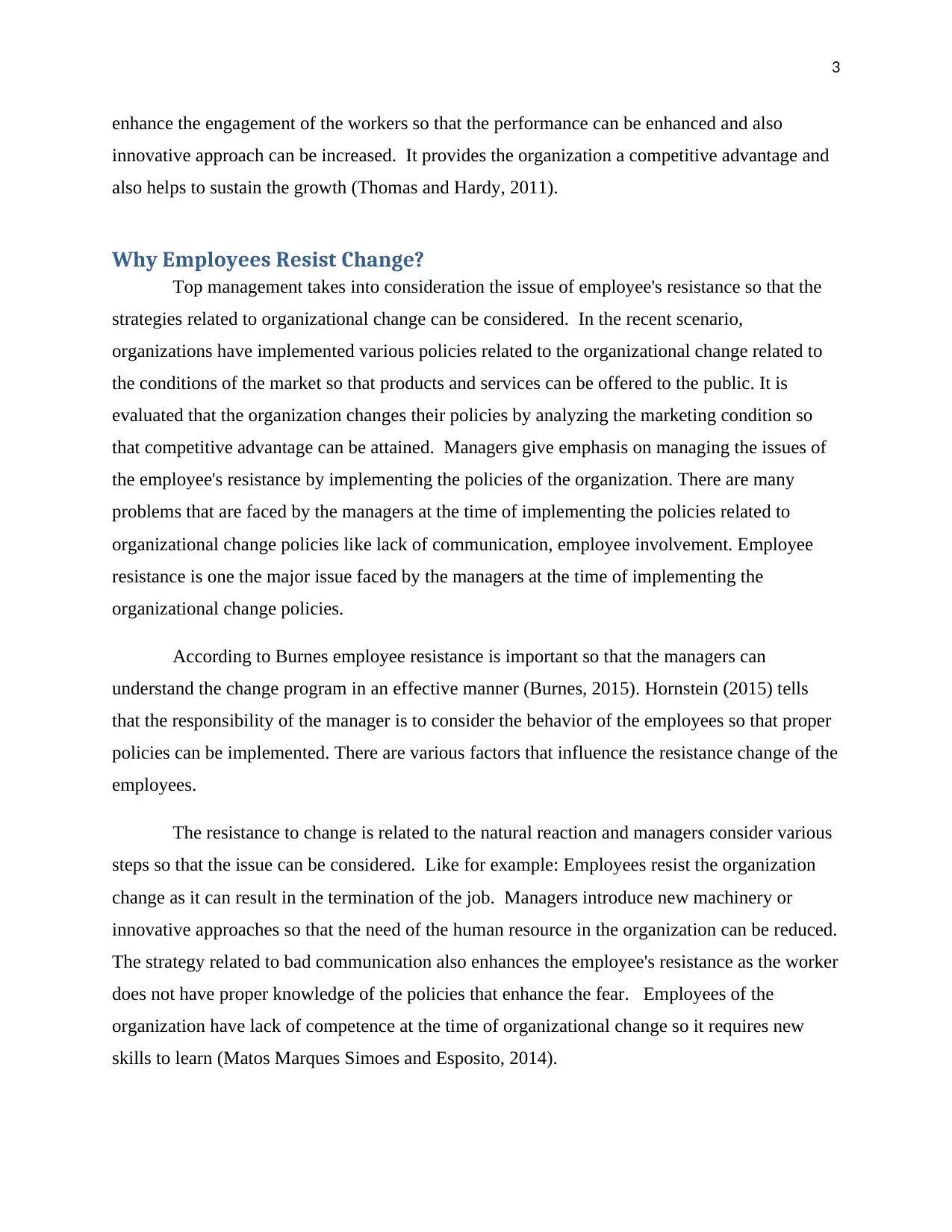
3
enhance the engagement of the workers so that the performance can be enhanced and also
innovative approach can be increased. It provides the organization a competitive advantage and
also helps to sustain the growth (Thomas and Hardy, 2011).
Why Employees Resist Change?
Top management takes into consideration the issue of employee's resistance so that the
strategies related to organizational change can be considered. In the recent scenario,
organizations have implemented various policies related to the organizational change related to
the conditions of the market so that products and services can be offered to the public. It is
evaluated that the organization changes their policies by analyzing the marketing condition so
that competitive advantage can be attained. Managers give emphasis on managing the issues of
the employee's resistance by implementing the policies of the organization. There are many
problems that are faced by the managers at the time of implementing the policies related to
organizational change policies like lack of communication, employee involvement. Employee
resistance is one the major issue faced by the managers at the time of implementing the
organizational change policies.
According to Burnes employee resistance is important so that the managers can
understand the change program in an effective manner (Burnes, 2015). Hornstein (2015) tells
that the responsibility of the manager is to consider the behavior of the employees so that proper
policies can be implemented. There are various factors that influence the resistance change of the
employees.
The resistance to change is related to the natural reaction and managers consider various
steps so that the issue can be considered. Like for example: Employees resist the organization
change as it can result in the termination of the job. Managers introduce new machinery or
innovative approaches so that the need of the human resource in the organization can be reduced.
The strategy related to bad communication also enhances the employee's resistance as the worker
does not have proper knowledge of the policies that enhance the fear. Employees of the
organization have lack of competence at the time of organizational change so it requires new
skills to learn (Matos Marques Simoes and Esposito, 2014).
enhance the engagement of the workers so that the performance can be enhanced and also
innovative approach can be increased. It provides the organization a competitive advantage and
also helps to sustain the growth (Thomas and Hardy, 2011).
Why Employees Resist Change?
Top management takes into consideration the issue of employee's resistance so that the
strategies related to organizational change can be considered. In the recent scenario,
organizations have implemented various policies related to the organizational change related to
the conditions of the market so that products and services can be offered to the public. It is
evaluated that the organization changes their policies by analyzing the marketing condition so
that competitive advantage can be attained. Managers give emphasis on managing the issues of
the employee's resistance by implementing the policies of the organization. There are many
problems that are faced by the managers at the time of implementing the policies related to
organizational change policies like lack of communication, employee involvement. Employee
resistance is one the major issue faced by the managers at the time of implementing the
organizational change policies.
According to Burnes employee resistance is important so that the managers can
understand the change program in an effective manner (Burnes, 2015). Hornstein (2015) tells
that the responsibility of the manager is to consider the behavior of the employees so that proper
policies can be implemented. There are various factors that influence the resistance change of the
employees.
The resistance to change is related to the natural reaction and managers consider various
steps so that the issue can be considered. Like for example: Employees resist the organization
change as it can result in the termination of the job. Managers introduce new machinery or
innovative approaches so that the need of the human resource in the organization can be reduced.
The strategy related to bad communication also enhances the employee's resistance as the worker
does not have proper knowledge of the policies that enhance the fear. Employees of the
organization have lack of competence at the time of organizational change so it requires new
skills to learn (Matos Marques Simoes and Esposito, 2014).
Paraphrase This Document
Need a fresh take? Get an instant paraphrase of this document with our AI Paraphraser
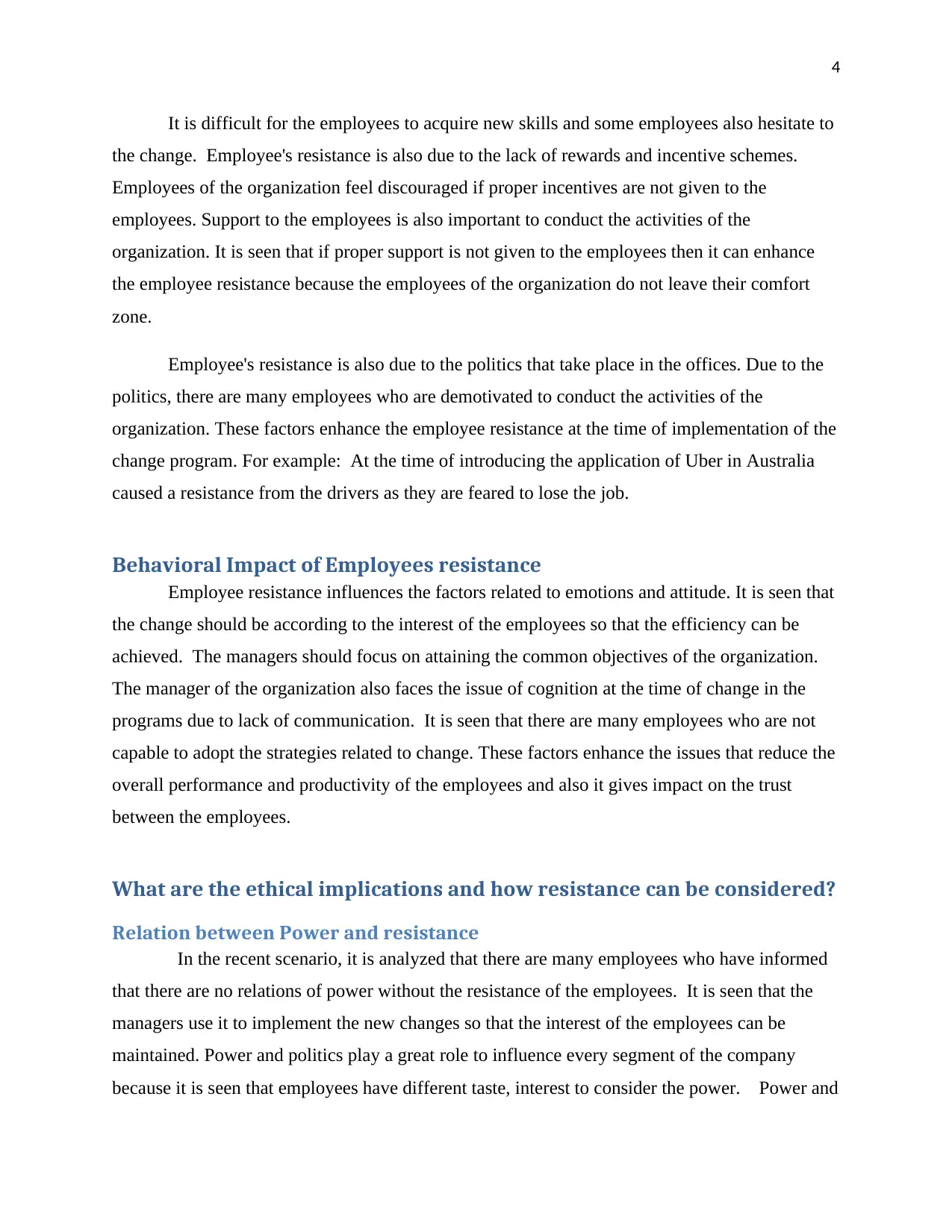
4
It is difficult for the employees to acquire new skills and some employees also hesitate to
the change. Employee's resistance is also due to the lack of rewards and incentive schemes.
Employees of the organization feel discouraged if proper incentives are not given to the
employees. Support to the employees is also important to conduct the activities of the
organization. It is seen that if proper support is not given to the employees then it can enhance
the employee resistance because the employees of the organization do not leave their comfort
zone.
Employee's resistance is also due to the politics that take place in the offices. Due to the
politics, there are many employees who are demotivated to conduct the activities of the
organization. These factors enhance the employee resistance at the time of implementation of the
change program. For example: At the time of introducing the application of Uber in Australia
caused a resistance from the drivers as they are feared to lose the job.
Behavioral Impact of Employees resistance
Employee resistance influences the factors related to emotions and attitude. It is seen that
the change should be according to the interest of the employees so that the efficiency can be
achieved. The managers should focus on attaining the common objectives of the organization.
The manager of the organization also faces the issue of cognition at the time of change in the
programs due to lack of communication. It is seen that there are many employees who are not
capable to adopt the strategies related to change. These factors enhance the issues that reduce the
overall performance and productivity of the employees and also it gives impact on the trust
between the employees.
What are the ethical implications and how resistance can be considered?
Relation between Power and resistance
In the recent scenario, it is analyzed that there are many employees who have informed
that there are no relations of power without the resistance of the employees. It is seen that the
managers use it to implement the new changes so that the interest of the employees can be
maintained. Power and politics play a great role to influence every segment of the company
because it is seen that employees have different taste, interest to consider the power. Power and
It is difficult for the employees to acquire new skills and some employees also hesitate to
the change. Employee's resistance is also due to the lack of rewards and incentive schemes.
Employees of the organization feel discouraged if proper incentives are not given to the
employees. Support to the employees is also important to conduct the activities of the
organization. It is seen that if proper support is not given to the employees then it can enhance
the employee resistance because the employees of the organization do not leave their comfort
zone.
Employee's resistance is also due to the politics that take place in the offices. Due to the
politics, there are many employees who are demotivated to conduct the activities of the
organization. These factors enhance the employee resistance at the time of implementation of the
change program. For example: At the time of introducing the application of Uber in Australia
caused a resistance from the drivers as they are feared to lose the job.
Behavioral Impact of Employees resistance
Employee resistance influences the factors related to emotions and attitude. It is seen that
the change should be according to the interest of the employees so that the efficiency can be
achieved. The managers should focus on attaining the common objectives of the organization.
The manager of the organization also faces the issue of cognition at the time of change in the
programs due to lack of communication. It is seen that there are many employees who are not
capable to adopt the strategies related to change. These factors enhance the issues that reduce the
overall performance and productivity of the employees and also it gives impact on the trust
between the employees.
What are the ethical implications and how resistance can be considered?
Relation between Power and resistance
In the recent scenario, it is analyzed that there are many employees who have informed
that there are no relations of power without the resistance of the employees. It is seen that the
managers use it to implement the new changes so that the interest of the employees can be
maintained. Power and politics play a great role to influence every segment of the company
because it is seen that employees have different taste, interest to consider the power. Power and
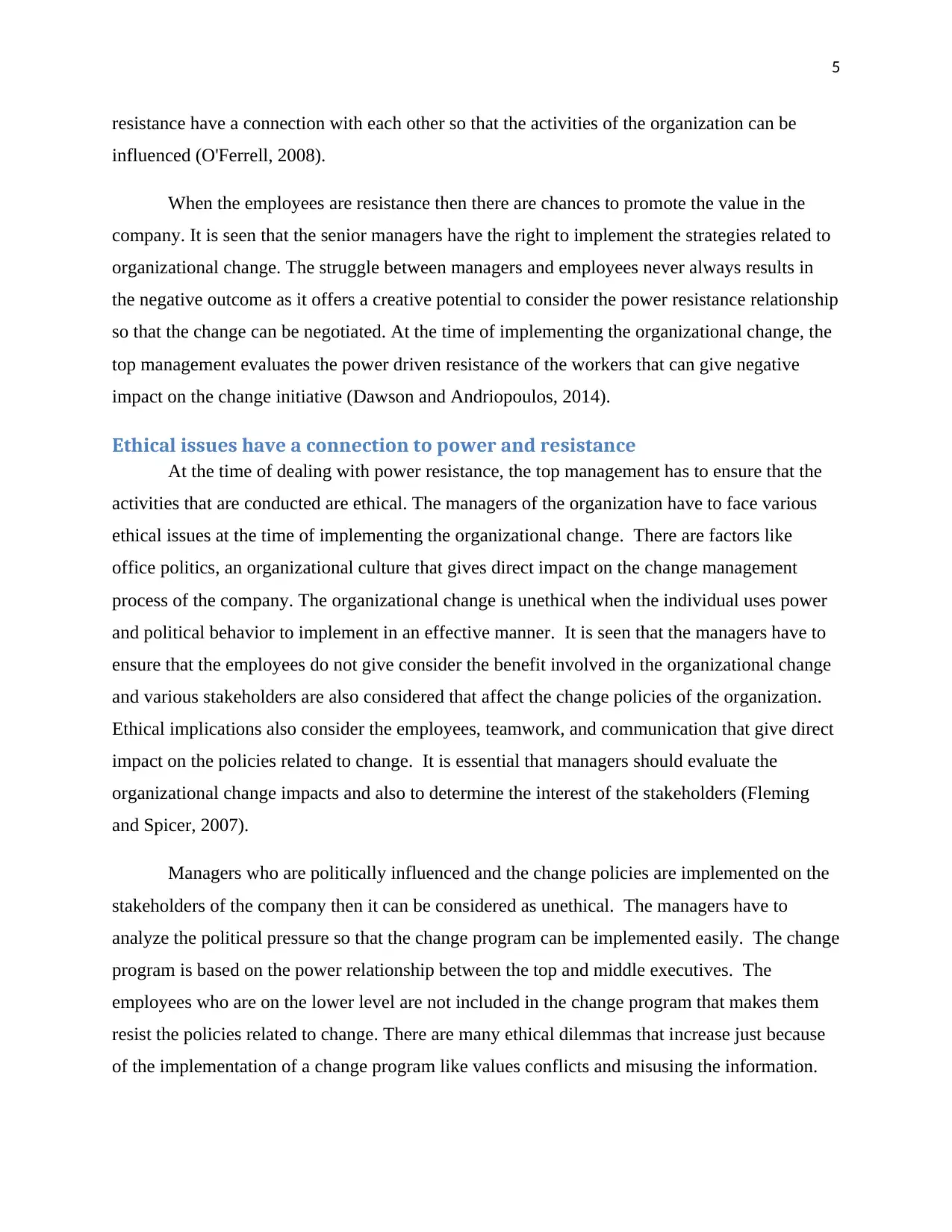
5
resistance have a connection with each other so that the activities of the organization can be
influenced (O'Ferrell, 2008).
When the employees are resistance then there are chances to promote the value in the
company. It is seen that the senior managers have the right to implement the strategies related to
organizational change. The struggle between managers and employees never always results in
the negative outcome as it offers a creative potential to consider the power resistance relationship
so that the change can be negotiated. At the time of implementing the organizational change, the
top management evaluates the power driven resistance of the workers that can give negative
impact on the change initiative (Dawson and Andriopoulos, 2014).
Ethical issues have a connection to power and resistance
At the time of dealing with power resistance, the top management has to ensure that the
activities that are conducted are ethical. The managers of the organization have to face various
ethical issues at the time of implementing the organizational change. There are factors like
office politics, an organizational culture that gives direct impact on the change management
process of the company. The organizational change is unethical when the individual uses power
and political behavior to implement in an effective manner. It is seen that the managers have to
ensure that the employees do not give consider the benefit involved in the organizational change
and various stakeholders are also considered that affect the change policies of the organization.
Ethical implications also consider the employees, teamwork, and communication that give direct
impact on the policies related to change. It is essential that managers should evaluate the
organizational change impacts and also to determine the interest of the stakeholders (Fleming
and Spicer, 2007).
Managers who are politically influenced and the change policies are implemented on the
stakeholders of the company then it can be considered as unethical. The managers have to
analyze the political pressure so that the change program can be implemented easily. The change
program is based on the power relationship between the top and middle executives. The
employees who are on the lower level are not included in the change program that makes them
resist the policies related to change. There are many ethical dilemmas that increase just because
of the implementation of a change program like values conflicts and misusing the information.
resistance have a connection with each other so that the activities of the organization can be
influenced (O'Ferrell, 2008).
When the employees are resistance then there are chances to promote the value in the
company. It is seen that the senior managers have the right to implement the strategies related to
organizational change. The struggle between managers and employees never always results in
the negative outcome as it offers a creative potential to consider the power resistance relationship
so that the change can be negotiated. At the time of implementing the organizational change, the
top management evaluates the power driven resistance of the workers that can give negative
impact on the change initiative (Dawson and Andriopoulos, 2014).
Ethical issues have a connection to power and resistance
At the time of dealing with power resistance, the top management has to ensure that the
activities that are conducted are ethical. The managers of the organization have to face various
ethical issues at the time of implementing the organizational change. There are factors like
office politics, an organizational culture that gives direct impact on the change management
process of the company. The organizational change is unethical when the individual uses power
and political behavior to implement in an effective manner. It is seen that the managers have to
ensure that the employees do not give consider the benefit involved in the organizational change
and various stakeholders are also considered that affect the change policies of the organization.
Ethical implications also consider the employees, teamwork, and communication that give direct
impact on the policies related to change. It is essential that managers should evaluate the
organizational change impacts and also to determine the interest of the stakeholders (Fleming
and Spicer, 2007).
Managers who are politically influenced and the change policies are implemented on the
stakeholders of the company then it can be considered as unethical. The managers have to
analyze the political pressure so that the change program can be implemented easily. The change
program is based on the power relationship between the top and middle executives. The
employees who are on the lower level are not included in the change program that makes them
resist the policies related to change. There are many ethical dilemmas that increase just because
of the implementation of a change program like values conflicts and misusing the information.
⊘ This is a preview!⊘
Do you want full access?
Subscribe today to unlock all pages.

Trusted by 1+ million students worldwide
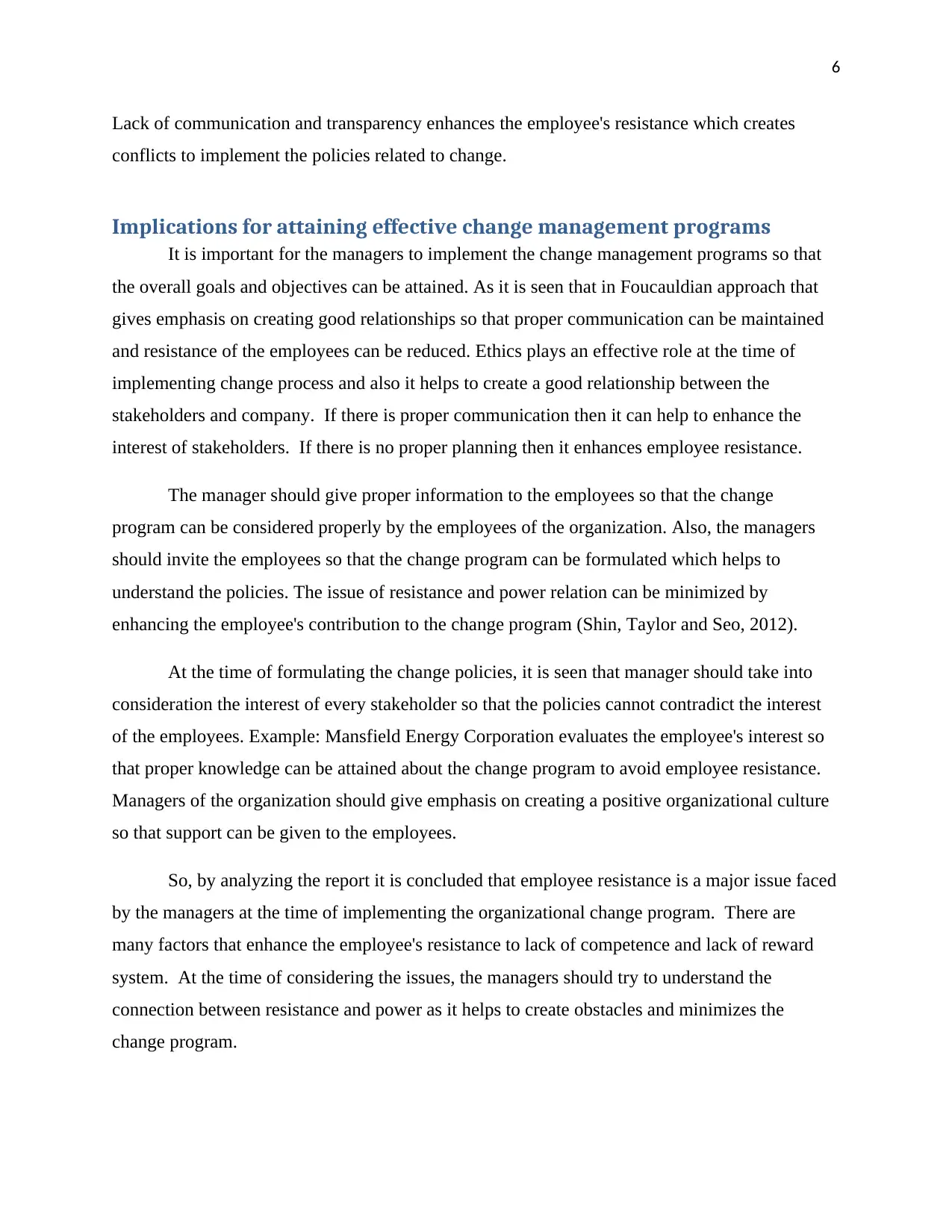
6
Lack of communication and transparency enhances the employee's resistance which creates
conflicts to implement the policies related to change.
Implications for attaining effective change management programs
It is important for the managers to implement the change management programs so that
the overall goals and objectives can be attained. As it is seen that in Foucauldian approach that
gives emphasis on creating good relationships so that proper communication can be maintained
and resistance of the employees can be reduced. Ethics plays an effective role at the time of
implementing change process and also it helps to create a good relationship between the
stakeholders and company. If there is proper communication then it can help to enhance the
interest of stakeholders. If there is no proper planning then it enhances employee resistance.
The manager should give proper information to the employees so that the change
program can be considered properly by the employees of the organization. Also, the managers
should invite the employees so that the change program can be formulated which helps to
understand the policies. The issue of resistance and power relation can be minimized by
enhancing the employee's contribution to the change program (Shin, Taylor and Seo, 2012).
At the time of formulating the change policies, it is seen that manager should take into
consideration the interest of every stakeholder so that the policies cannot contradict the interest
of the employees. Example: Mansfield Energy Corporation evaluates the employee's interest so
that proper knowledge can be attained about the change program to avoid employee resistance.
Managers of the organization should give emphasis on creating a positive organizational culture
so that support can be given to the employees.
So, by analyzing the report it is concluded that employee resistance is a major issue faced
by the managers at the time of implementing the organizational change program. There are
many factors that enhance the employee's resistance to lack of competence and lack of reward
system. At the time of considering the issues, the managers should try to understand the
connection between resistance and power as it helps to create obstacles and minimizes the
change program.
Lack of communication and transparency enhances the employee's resistance which creates
conflicts to implement the policies related to change.
Implications for attaining effective change management programs
It is important for the managers to implement the change management programs so that
the overall goals and objectives can be attained. As it is seen that in Foucauldian approach that
gives emphasis on creating good relationships so that proper communication can be maintained
and resistance of the employees can be reduced. Ethics plays an effective role at the time of
implementing change process and also it helps to create a good relationship between the
stakeholders and company. If there is proper communication then it can help to enhance the
interest of stakeholders. If there is no proper planning then it enhances employee resistance.
The manager should give proper information to the employees so that the change
program can be considered properly by the employees of the organization. Also, the managers
should invite the employees so that the change program can be formulated which helps to
understand the policies. The issue of resistance and power relation can be minimized by
enhancing the employee's contribution to the change program (Shin, Taylor and Seo, 2012).
At the time of formulating the change policies, it is seen that manager should take into
consideration the interest of every stakeholder so that the policies cannot contradict the interest
of the employees. Example: Mansfield Energy Corporation evaluates the employee's interest so
that proper knowledge can be attained about the change program to avoid employee resistance.
Managers of the organization should give emphasis on creating a positive organizational culture
so that support can be given to the employees.
So, by analyzing the report it is concluded that employee resistance is a major issue faced
by the managers at the time of implementing the organizational change program. There are
many factors that enhance the employee's resistance to lack of competence and lack of reward
system. At the time of considering the issues, the managers should try to understand the
connection between resistance and power as it helps to create obstacles and minimizes the
change program.
Paraphrase This Document
Need a fresh take? Get an instant paraphrase of this document with our AI Paraphraser
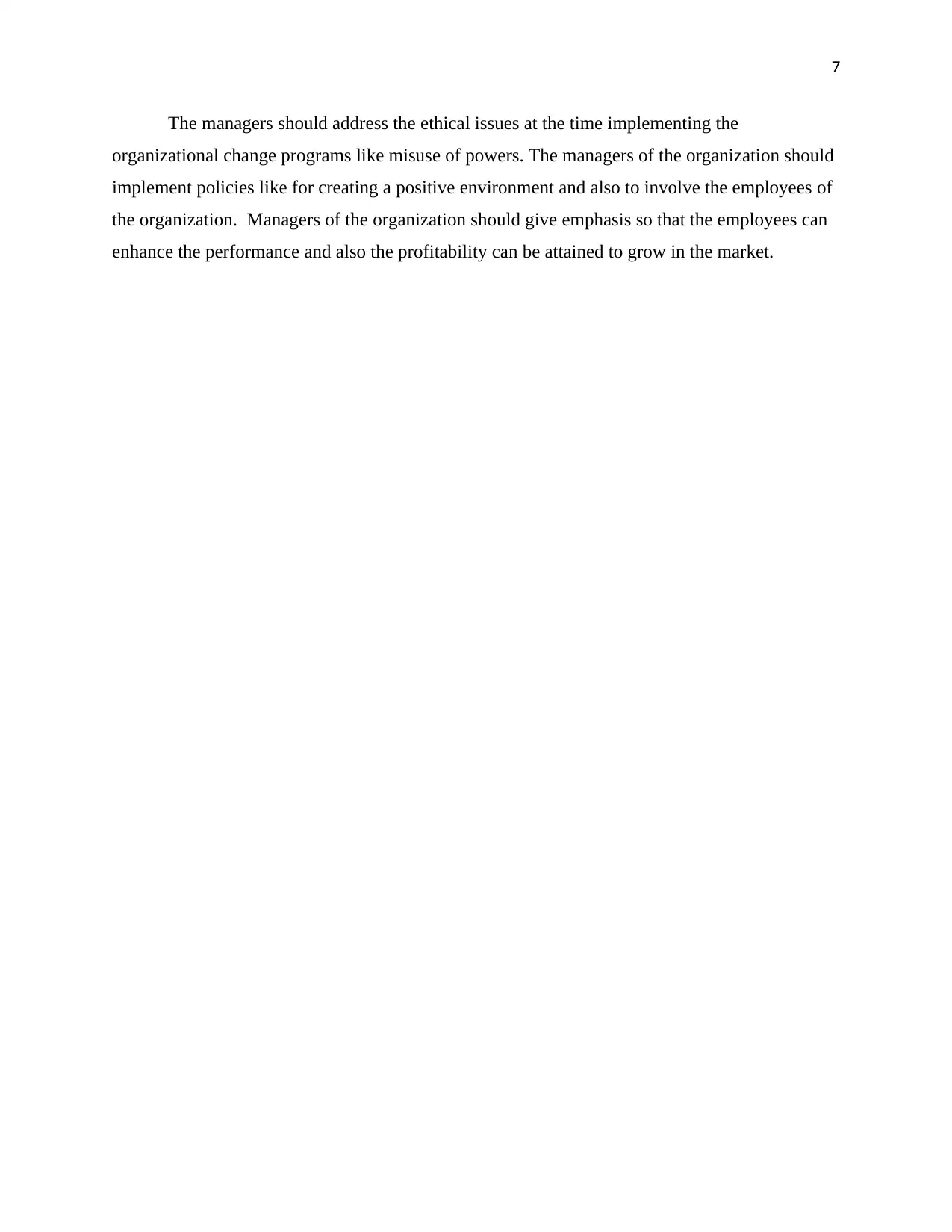
7
The managers should address the ethical issues at the time implementing the
organizational change programs like misuse of powers. The managers of the organization should
implement policies like for creating a positive environment and also to involve the employees of
the organization. Managers of the organization should give emphasis so that the employees can
enhance the performance and also the profitability can be attained to grow in the market.
The managers should address the ethical issues at the time implementing the
organizational change programs like misuse of powers. The managers of the organization should
implement policies like for creating a positive environment and also to involve the employees of
the organization. Managers of the organization should give emphasis so that the employees can
enhance the performance and also the profitability can be attained to grow in the market.
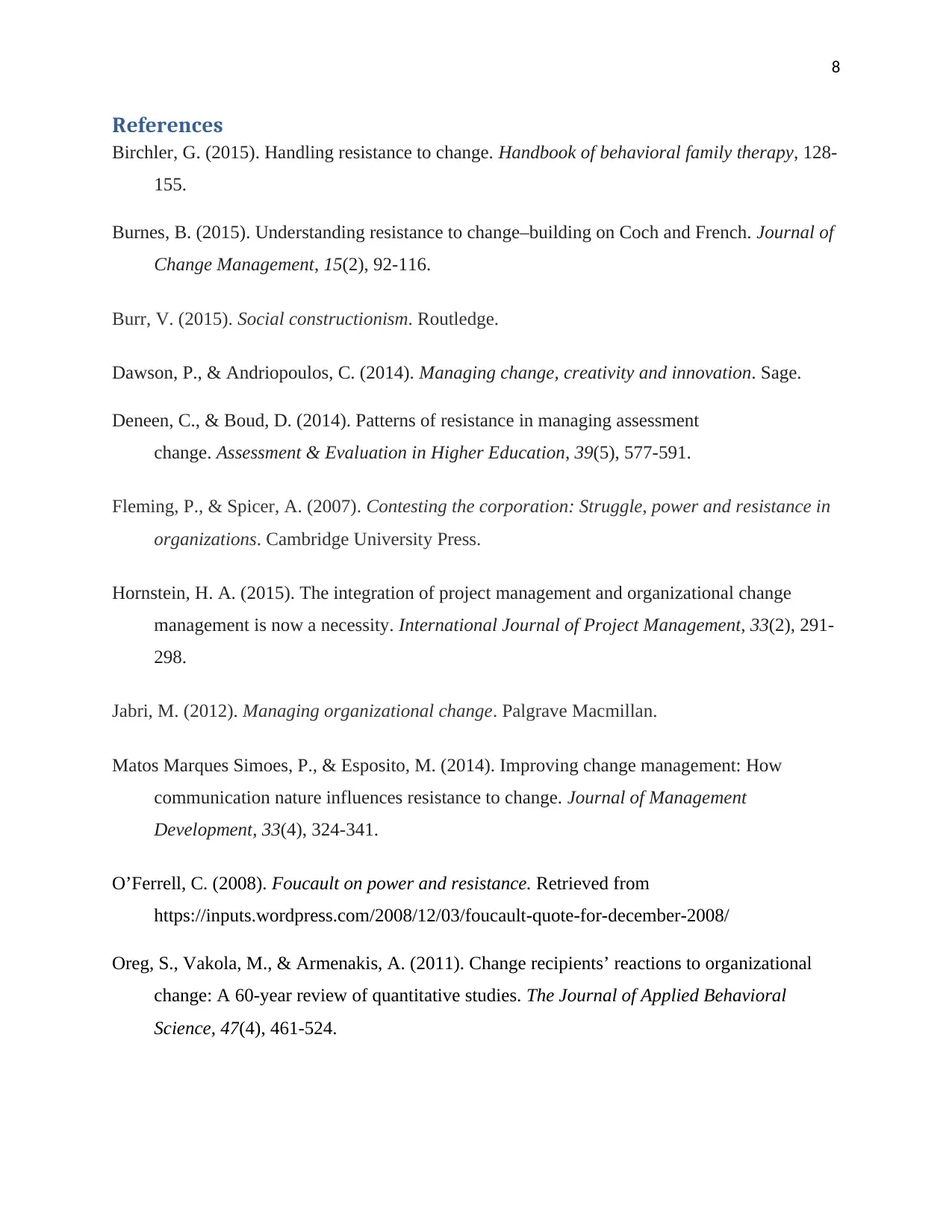
8
References
Birchler, G. (2015). Handling resistance to change. Handbook of behavioral family therapy, 128-
155.
Burnes, B. (2015). Understanding resistance to change–building on Coch and French. Journal of
Change Management, 15(2), 92-116.
Burr, V. (2015). Social constructionism. Routledge.
Dawson, P., & Andriopoulos, C. (2014). Managing change, creativity and innovation. Sage.
Deneen, C., & Boud, D. (2014). Patterns of resistance in managing assessment
change. Assessment & Evaluation in Higher Education, 39(5), 577-591.
Fleming, P., & Spicer, A. (2007). Contesting the corporation: Struggle, power and resistance in
organizations. Cambridge University Press.
Hornstein, H. A. (2015). The integration of project management and organizational change
management is now a necessity. International Journal of Project Management, 33(2), 291-
298.
Jabri, M. (2012). Managing organizational change. Palgrave Macmillan.
Matos Marques Simoes, P., & Esposito, M. (2014). Improving change management: How
communication nature influences resistance to change. Journal of Management
Development, 33(4), 324-341.
O’Ferrell, C. (2008). Foucault on power and resistance. Retrieved from
https://inputs.wordpress.com/2008/12/03/foucault-quote-for-december-2008/
Oreg, S., Vakola, M., & Armenakis, A. (2011). Change recipients’ reactions to organizational
change: A 60-year review of quantitative studies. The Journal of Applied Behavioral
Science, 47(4), 461-524.
References
Birchler, G. (2015). Handling resistance to change. Handbook of behavioral family therapy, 128-
155.
Burnes, B. (2015). Understanding resistance to change–building on Coch and French. Journal of
Change Management, 15(2), 92-116.
Burr, V. (2015). Social constructionism. Routledge.
Dawson, P., & Andriopoulos, C. (2014). Managing change, creativity and innovation. Sage.
Deneen, C., & Boud, D. (2014). Patterns of resistance in managing assessment
change. Assessment & Evaluation in Higher Education, 39(5), 577-591.
Fleming, P., & Spicer, A. (2007). Contesting the corporation: Struggle, power and resistance in
organizations. Cambridge University Press.
Hornstein, H. A. (2015). The integration of project management and organizational change
management is now a necessity. International Journal of Project Management, 33(2), 291-
298.
Jabri, M. (2012). Managing organizational change. Palgrave Macmillan.
Matos Marques Simoes, P., & Esposito, M. (2014). Improving change management: How
communication nature influences resistance to change. Journal of Management
Development, 33(4), 324-341.
O’Ferrell, C. (2008). Foucault on power and resistance. Retrieved from
https://inputs.wordpress.com/2008/12/03/foucault-quote-for-december-2008/
Oreg, S., Vakola, M., & Armenakis, A. (2011). Change recipients’ reactions to organizational
change: A 60-year review of quantitative studies. The Journal of Applied Behavioral
Science, 47(4), 461-524.
⊘ This is a preview!⊘
Do you want full access?
Subscribe today to unlock all pages.

Trusted by 1+ million students worldwide
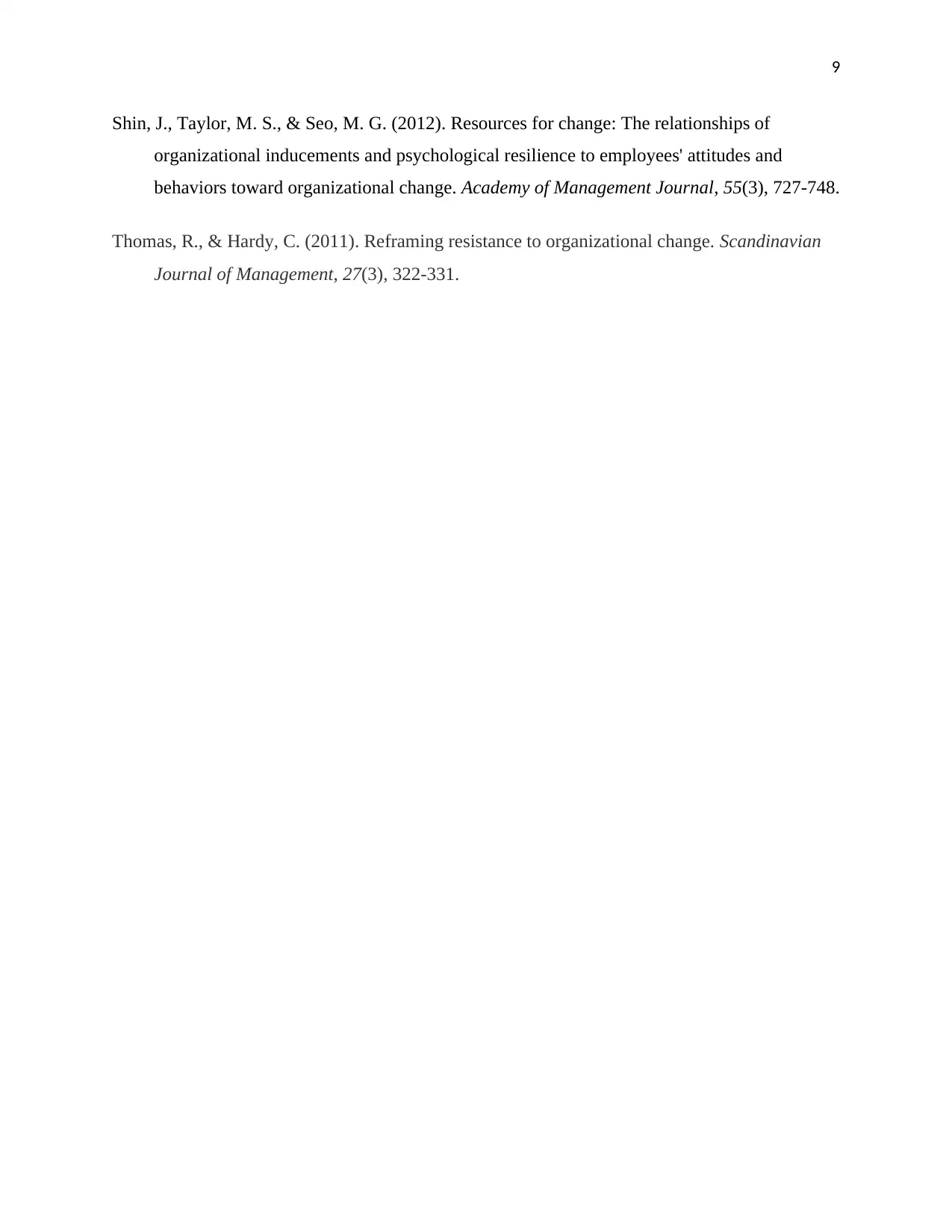
9
Shin, J., Taylor, M. S., & Seo, M. G. (2012). Resources for change: The relationships of
organizational inducements and psychological resilience to employees' attitudes and
behaviors toward organizational change. Academy of Management Journal, 55(3), 727-748.
Thomas, R., & Hardy, C. (2011). Reframing resistance to organizational change. Scandinavian
Journal of Management, 27(3), 322-331.
Shin, J., Taylor, M. S., & Seo, M. G. (2012). Resources for change: The relationships of
organizational inducements and psychological resilience to employees' attitudes and
behaviors toward organizational change. Academy of Management Journal, 55(3), 727-748.
Thomas, R., & Hardy, C. (2011). Reframing resistance to organizational change. Scandinavian
Journal of Management, 27(3), 322-331.
Paraphrase This Document
Need a fresh take? Get an instant paraphrase of this document with our AI Paraphraser

10

11
⊘ This is a preview!⊘
Do you want full access?
Subscribe today to unlock all pages.

Trusted by 1+ million students worldwide
1 out of 12
Related Documents
Your All-in-One AI-Powered Toolkit for Academic Success.
+13062052269
info@desklib.com
Available 24*7 on WhatsApp / Email
![[object Object]](/_next/static/media/star-bottom.7253800d.svg)
Unlock your academic potential
Copyright © 2020–2026 A2Z Services. All Rights Reserved. Developed and managed by ZUCOL.





